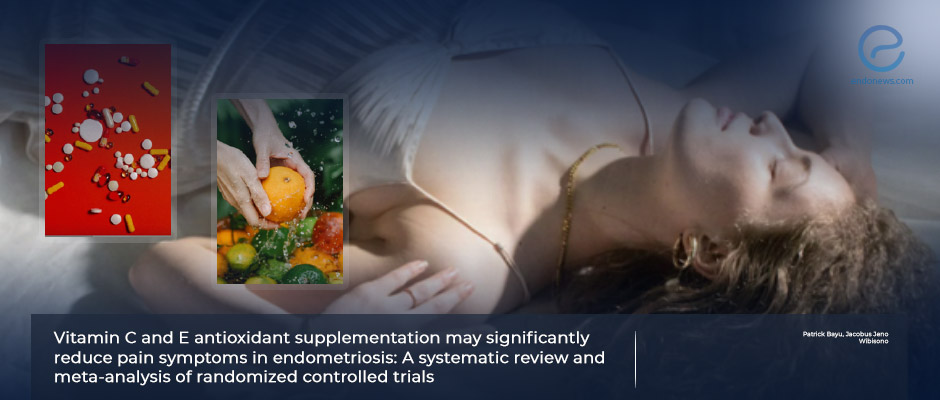Endometriosis relief: How vitamins C and E can make a difference
Jul 23, 2024
Meta-analysis shows vitamins C and E significantly reduce endometriosis-related pain
Key Points
Highlights
- Antioxidant supplementation with a combination of vitamin C and vitamin E significantly reduces various types of pain associated with endometriosis, including chronic pelvic pain, dysmenorrhea, and dyspareunia, compared to a placebo.
Importance
- The study suggests that antioxidant supplementation with vitamins C and E can effectively reduce pain in women with endometriosis, offering a safer alternative to traditional treatments.
- It enhances understanding of oxidative stress in endometriosis, supporting the development of targeted therapies for better management of the condition.
What’s done here
- This is a meta-analysis performed by searching four databases (Europe PMC, Scopus, PubMed Medline, and ClinicalTrials.gov).
- Five randomized controlled trials with a total of 338 endometriosis patients were included.
- Pain-related outcomes, including chronic pelvic pain, dysmenorrhea, and dyspareunia were evaluated and the data was analyzed to calculate risk ratios and assess heterogeneity.
Results
- Vitamin C and E supplementation significantly reduced chronic pelvic pain in endometriosis patients compared to placebo.
- Antioxidant supplementation was associated with a notable reduction in dysmenorrhea compared to placebo.
- Dyspareunia was significantly alleviated in the antioxidant group compared to the placebo group.
Limitations
- Small sample sizes, short follow-up periods and the lack of detailed data on pain scores and disease characteristics are the limitations.
Lay Summary
Recent studies indicate that oxidative stress significantly contributes to the onset and progression of endometriosis. High levels of reactive oxygen species (ROS) can cause cellular damage and enhance inflammation, leading to the pain associated with the condition. Antioxidants like vitamins C and E are believed to counteract ROS and help relieve this pain. Bayu and Wibisono from Indonesia performed a meta-analysis aiming to evaluate the effectiveness of combined vitamin C and vitamin E supplementation in reducing pain symptoms in endometriosis patients. It was published in the May 2024 issue of the journal PLOS ONE.
The study followed PRISMA guidelines and included all randomized controlled trials comparing the effectiveness of vitamin C and E supplementation against a placebo for alleviating pain in women with endometriosis. A comprehensive literature search was conducted across four major databases until August 2023, with specific search terms related to antioxidants and endometriosis. Data extraction and risk of bias assessment were performed independently by two reviewers, focusing on pain outcomes such as chronic pelvic pain, dysmenorrhea, and dyspareunia.
The meta-analysis was performed using the results of 5 randomized controlled trial studies that fit all the criteria which included 338 endometriosis patients. It was revealed that vitamin C and E supplementation significantly reduced chronic pelvic pain compared to placebo, with a notable improvement in the antioxidant group. Dysmenorrhea outcomes showed a higher proportion of pain relief in the antioxidant group than in the placebo group. Dyspareunia was also significantly alleviated with antioxidant supplementation, demonstrating a greater reduction in pain scores compared to placebo.
The authors state that their meta-analysis confirmed the hypothesis that antioxidant supplementation with vitamin C and vitamin E can significantly reduce pain symptoms, including chronic pelvic pain, dysmenorrhea, and dyspareunia, in patients with endometriosis compared to a placebo. They add that despite some concerns about the risk of bias in four out of five included studies, the findings align with previous research, emphasizing the effectiveness of these vitamins in pain management for endometriosis.
It is concluded that antioxidant supplementation with vitamins C and E may mitigate pain symptoms in endometriosis patients, however, further research with larger, well-designed randomized controlled trials is necessary to validate these findings and assess long-term effects and safety.
Research Source: https://pubmed.ncbi.nlm.nih.gov/38820340/
endometriosis pain vitamin C vitamin E antioxidant dysmenorrhea dyspareunia

